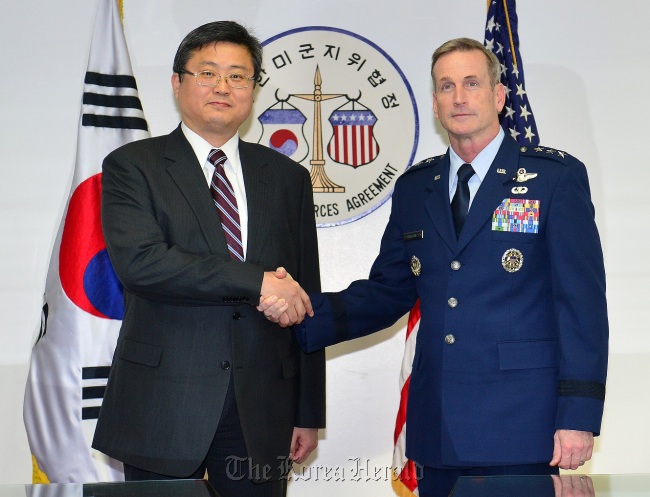‘USFK conducted 16 covert anthrax tests since 2009’
By Shin Hyon-heePublished : Dec. 17, 2015 - 20:11
The U.S. Forces Korea has conducted 16 rounds of clandestine experiments involving dead anthrax samples and one plague test since 2009, a joint investigation panel said Thursday, upending Washington’s previous claim that last May’s anthrax shipment marked its first-ever trial here.
In late May, 22 U.S. servicemen were found to have possibly come into contact with the lethal bacteria sent to Osan Air Base in Gyeonggi Province from a military laboratory in Utah.
Though the USFK said that none of them had shown signs of infection and the substances were destroyed immediately, the incident fueled vehement protests by civic groups over what they called porous customs clearance, and prompted the allies to launch a working group for a fact-finding probe in July.
Announcing the results, the panel said the USFK had brought in and tested dead anthrax samples 15 times at Yongsan Garrison in central Seoul between 2009 and 2014. That adds to the May exercise for which it mailed 1 milliliter of inactive Yersinia pestis (bubonic plague) samples alongside the same amount of possibly live anthrax bacilli.
“We confirmed that USFK imported inactivated Bacillus anthracis test samples as well as inactivated Yersinia pestis samples for detection and identification training ... while safely decontaminating the facility and destroying the samples,” said Maj. Gen. Chang Kyung-soo, director general for policy planning at Seoul’s Defense Ministry, who jointly heads the joint working group.
In late May, 22 U.S. servicemen were found to have possibly come into contact with the lethal bacteria sent to Osan Air Base in Gyeonggi Province from a military laboratory in Utah.
Though the USFK said that none of them had shown signs of infection and the substances were destroyed immediately, the incident fueled vehement protests by civic groups over what they called porous customs clearance, and prompted the allies to launch a working group for a fact-finding probe in July.
Announcing the results, the panel said the USFK had brought in and tested dead anthrax samples 15 times at Yongsan Garrison in central Seoul between 2009 and 2014. That adds to the May exercise for which it mailed 1 milliliter of inactive Yersinia pestis (bubonic plague) samples alongside the same amount of possibly live anthrax bacilli.
“We confirmed that USFK imported inactivated Bacillus anthracis test samples as well as inactivated Yersinia pestis samples for detection and identification training ... while safely decontaminating the facility and destroying the samples,” said Maj. Gen. Chang Kyung-soo, director general for policy planning at Seoul’s Defense Ministry, who jointly heads the joint working group.

While all deliveries of anthrax samples have been on hold for the time being for the improvement of inactivation procedures, the sides held a meeting of the Korea-U.S. Status of Forces Agreement Joint Committee later in the day and signed a recommendation to advance the notification mechanism and ensure safety for future biological exercises.
The measure, which took effect immediately, calls for the USFK to notify Seoul on the sender and receiver of incoming samples and their type, purpose and quantity, as well as the transport method.
In addition, the Korea Custom Service can contact USFK Customs to request coordination should it want to inspect any package.
“This is an unprecedented measure as it strengthened the safety procedure for inactivated test samples,” said Maj. Gen. Robert Hedelund, commander of U.S. Marine Corps Forces Korea, Jang’s counterpart and the other cochair.
Controversy, however, persists over the flip-flop on the USFK’s assertion and the South Korean military’s failure to perceive what turned out to be a years-long project involving deadly materials.
On May 29, the USFK issued a statement in Korean saying the incident took place during a “first-ever exercise aimed at ramping up its capabilities to protect the allied forces and South Koreans,” though its English version simply stated that the training followed “routine laboratory protocols and normal handling procedures.”
After Seoul officials demanded an explanation, USFK personnel replied that it meant it was the first they had conducted an anthrax test at the Osan base, not Yongsan.
Better known as the JUPITR program, Joint U.S. Forces Korea Portal and Integrated Threat Recognition came as part of Washington’s strategy to advance biosurveillance capabilities on the peninsula while rebalancing military assets in the Asia-Pacific region.
During the meeting, the sides assessed that North Korea may possess 13 types of biological agents, including anthrax and plague, raising the possibility for their use “for the purpose of terror or an all-out-war.”
“(The allies) shared the common belief that biological defense cooperation is absolutely needed to protect the life and safety of our citizens from increasing North Korean biological threats as well as worldwide biological terrorism,” they said in a joint statement, vowing to carry on with combined exercises and step up cooperation in biological defense.
By Shin Hyon-hee (heeshin@heraldcorp.com)








![[Graphic News] More Koreans say they plan long-distance trips this year](http://res.heraldm.com/phpwas/restmb_idxmake.php?idx=644&simg=/content/image/2024/04/17/20240417050828_0.gif&u=)
![[KH Explains] Hyundai's full hybrid edge to pay off amid slow transition to pure EVs](http://res.heraldm.com/phpwas/restmb_idxmake.php?idx=644&simg=/content/image/2024/04/18/20240418050645_0.jpg&u=20240419100350)





![[From the Scene] Monks, Buddhists hail return of remains of Buddhas](http://res.heraldm.com/phpwas/restmb_idxmake.php?idx=652&simg=/content/image/2024/04/19/20240419050617_0.jpg&u=20240419175937)

![[KH Explains] Hyundai's full hybrid edge to pay off amid slow transition to pure EVs](http://res.heraldm.com/phpwas/restmb_idxmake.php?idx=652&simg=/content/image/2024/04/18/20240418050645_0.jpg&u=20240419100350)

![[Today’s K-pop] Illit drops debut single remix](http://res.heraldm.com/phpwas/restmb_idxmake.php?idx=642&simg=/content/image/2024/04/19/20240419050612_0.jpg&u=)